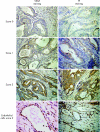The angiogenic switch occurs at the adenoma stage of the adenoma carcinoma sequence in colorectal cancer
- PMID: 17566019
- PMCID: PMC2000239
- DOI: 10.1136/gut.2007.125286
The angiogenic switch occurs at the adenoma stage of the adenoma carcinoma sequence in colorectal cancer
Abstract
Objective: The aim of this study was to examine the relationship between tissue factor (TF), vascular endothelial growth factor (VEGF) and the onset of angiogenesis in the adenoma-carcinoma sequence (ACS), the stepwise process encompassing colorectal cancer (CRC) disease progression.
Patients and methods: 210 surgical specimens comprising the ACS were immunohistochemically stained for endothelial cells (CD31), VEGF and TF. Angiogenesis quantified using Chalkley grid analysis (microvascular density; MVD), and VEGF/TF expression were semiquantitatively graded and correlated with standard prognostic indicators including 5 year follow-up. VEGF and TF were measured by ELISA in tumour specimens and normal mucosa from an additional 90 CRC patients.
Results: There was a significant increase in MVD across the ACS (p < 0.0005) with significant correlations with Dukes' stage (p = 0.01) and lymph node involvement (p = 0.02). The greatest increase in MVD was related to the onset of dysplasia, with an associated significant increase in VEGF expression (p < 0.0005). There was a significant relationship between VEGF and TF expression in the initial phase of the ACS (k = 0.44, p < 0.005), although no correlation between VEGF or TF, and MVD, tumour size, Dukes' classification, lymph node involvement or survival was found.
Conclusions: These findings are the first to suggest that the angiogenic switch occurs at the onset of dysplasia in the ACS, and provide further evidence of the close association between VEGF and TF in the early stages of CRC development.
Conflict of interest statement
Conflict of interest: None declared.
References
Publication types
MeSH terms
Substances
LinkOut - more resources
Full Text Sources
Medical
Miscellaneous




